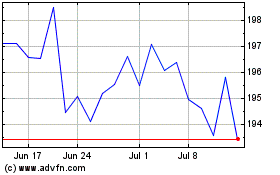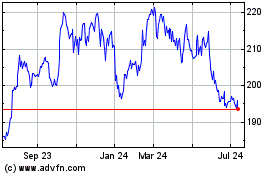Options-Exchange Leaders Lash Out At SEC's Proposed Fee Cap
April 30 2010 - 5:08PM
Dow Jones News
Leaders of the biggest U.S. stock-options exchanges on Friday
stepped up opposition to proposed regulations that could limit
trading fees for the contracts.
Executives of the Chicago Board Options Exchange and Nasdaq OMX
Group Inc. (NDAQ) lashed out at the proposed rule, arguing that the
market does a better job of determining what's right to charge
traders.
"We always prefer competitive forces," said Ed Tilly, executive
vice chairman at CBOE, speaking Friday at an industry event. "Those
are the forces that should change the fees."
The Securities and Exchange Commission earlier this month
proposed a rule that would cap the fees that options exchanges can
charge to access quotes, setting the limit at 30 cents per
contract.
The idea, similar to an existing rule for stock markets, is to
more closely align the displayed quote on an options exchange with
the actual amount that an investor would pay to buy or sell an
option.
Such a fee cap would limit the access fees charged by options
exchanges like Nasdaq OMX's PHLX platform and NYSE Euronext's (NYX)
Arca, where customers pay to interact with the markets'
liquidity.
It could also affect licensing and regulatory fees carried by
some proprietary options products, such as the CBOE's exclusive
contracts linked to the S&P 500 stock index or the VIX
volatility measure.
Bob Greifeld, chief executive of Nasdaq OMX, said Friday that
while the PHLX platform has enough "room to maneuver" on fees that
it can accommodate such a fee cap, the move raises questions about
the SEC's jurisdiction.
"We think it's wrong for the SEC to get into rate-setting in a
competitive marketplace," Greifeld said in an interview.
"The options marketplace is a hypercompetitive world, and the
fee capture available to exchanges has gone down sharply last
couple of years," he said. "Once that proper competitive
environment has been set up, I don't think that calls for
rate-setting."
Nasdaq OMX PHLX has much at stake with the new rule, having in
January introduced a new pricing program that has helped lift its
market share from 10% to 25% in the affected options classes.
Overall, the PHLX had about 21.7% of the U.S. options business in
April to date.
The CBOE, the largest U.S. options market by volume with 30.8%
of the market in April, is also vexed by the proposed rule.
Exclusive index options contracts make up a key source of revenue
for the company, which is pursuing a long-delayed initial public
offering slated for June.
According to estimates by the SEC issued this week, the proposed
rule could see the CBOE's annual revenue reduced by $23.9 million.
The CBOE has contested that figure, putting its own estimate at
$14.2 million. The company brought in about $426 million in
operating revenue last year.
CBOE's Tilly stressed the costly process of developing products
like the VIX, an oft-quoted barometer measuring potential
turbulence in the stock market.
Exchanges also incur expenses associated with licensing other
companies' indexes, such as the benchmark S&P 500.
"You just can't ignore those costs," Tilly said.
-By Jacob Bunge, Dow Jones Newswires; (312) 750 4117;
jacob.bunge@dowjones.com
CME (NASDAQ:CME)
Historical Stock Chart
From Jun 2024 to Jul 2024

CME (NASDAQ:CME)
Historical Stock Chart
From Jul 2023 to Jul 2024
